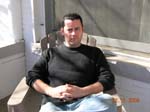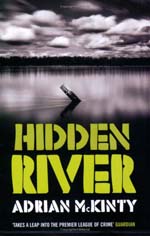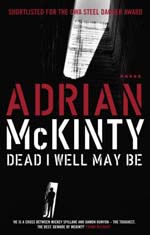- Welcome
- Noir Zine
- Allan Guthrie
- Books
"...those who enjoy the darker side of the genre are in for some serious thrills with this..."
Laura Wilson, The Guardian

Published in the UK by Polygon (March 19th, '09) and in the US by Houghton Mifflin Harcourt (Nov '09).
Adrian mckinty
by Gerard Brennan

Gerard Brennan: You’ve lived in about a thousand places, and you like to write what you know. With New York, Boston, Denver, Lima, Belfast and Dublin among the cities crossed off your list in your recent works, where will your next novel take us?
Adrian McKinty: Havana, Cuba. Late last year I went there for a holiday and instead of finding the funky worker’s paradise I (as a loyal Guardian reader) had been expecting, I found myself in a corrupt, decrepit city filled with prostitutes, child prostitutes, pimps and sex tourists. I knew I’d get an article out of the trip at least and then after two more trips I knew that there was a novel in that material.
GB: Michael Forsythe, a hard man. Is there much of you in him?
AM: We both love Zeppelin but that’s about it. I haven’t hit anyone for about 15 years. With Michael it’s about 15 minutes.
 GB: I thought Hidden River was brilliant and that Alex Lawson was a real standout character. Any chance of you writing him into another book?
GB: I thought Hidden River was brilliant and that Alex Lawson was a real standout character. Any chance of you writing him into another book?
AM: I’ve been toying with that idea. Alex seems to work best when he’s down on his luck, screwing everything up, so I’d have to put him through the mill again. Yeah that’s a possibility.
GB: How’s Australia treating you? When can we expect a novel set in St Kilda from you?
AM: St. Kilda is an excellent place for crime fiction. Within five blocks of my house we’ve got a mini casino, 10 pubs, Russian mafia, pimps, street prostitutes (St Kilda is famous for its prostitutes despite the fact that Melbourne has half a dozen LEGAL brothels), a homeless shelter, yuppie apartments and the police station. So I’ve got nothing cooking at the moment but the material is out there.
GB: You’re also write young adult fiction. What’s the deal with that?
AM: Ideas in search of an outlet that could only be expressed in YA form.
GB: When’s your next visit to Northern Ireland likely to happen? Do you think you’ll ever live here again?
AM: Now that house prices are collapsing its more of a possibility than it was a year ago. I may be over for Fifty Grand next summer, that’s up to Serpents Tail. (It’s an expensive flight from Oz)
GB: You’ve recently gotten into blogging and The Psychopathology of Everyday Life seems to be grabbing all sorts of attention. I’ve seen fans and the odd person of slightly dubious sanity enjoying a wee bit of banter with you in the comments section. How are you finding that experience?
AM: Blogging’s fun, though to be honest I think it takes up way too much of my time. I’m teaching part-time, trying to live my life, raise my kids, but also I should really be writing a novel to follow up 50 G instead of having a laff blogging away. I read somewhere that William Gibson had to shut down his blog so that he could write his new novel. I don’t think I’d go that far but when the new book does begin to materialise I must discipline myself a little more.
GB: And you’re a teacher when you’re not writing novels. Can I assume you teach English literature? How does the job satisfaction compare to writing THE END at the bottom of a manuscript?
AM: I enjoy teaching, especially with older kids. Sharing your favourite novels with a bunch of weans is one of the great joys of life. To be honest I’m never satisfied with any of my novels, even when they’re in print. I’m always thinking about a scene I could have cut for pace or an image that could have been better or an opportunity for a joke that I missed.
GB: It’s often remarked that your prose verges on the poetic. Is this something that comes natural to you?
AM: Oh yeah I’m a poet and don’t even know it… You see what I did there? Genius.
GB: There’s another novel you don’t mention very often. Everything Rhymes with Orange. Care to mention it now?
 AM: Orange Rhymes with Everything old chap. Happy to talk about it. That was my first book. It’s basically two novellas packaged into one volume. The whole thing is a little under 60,000 words. It came out with William Morrow in the US in 1998. One story is about a girl growing up in Carrickfergus who has a creepy relationship with a teacher and the other is about her father who has been imprisoned in America. I was quite pleased with it. Everyone else hated it though. The reviews said the prose was way too dense and the dialect unreadable. The New York Times said it was too dark and too incoherent. Anyway after that came out I stopped work on writing my debut novel to re-evaluate what everyone said (that’s why there’s a five year gap between my first and second books). I tried a lot of different styles and angles but after three years of experimenting I just thought to hell with it, I’m just going to write my way for me and if nobody else likes it so be it, so I wrote Dead I Well May Be and that time the critics couldn’t have been kinder (on the whole). Is there a lesson there? Funnily enough I think there is. Yes, you should listen to people who are smarter than you and better read than you and you should re-evaluate yourself from time to time but ultimately you should be true to yourself and your own vision. One of my favourite books is Crash by JG Ballard. One reader’s report on that book said: “This man is beyond psychiatric help. DO NOT PUBLISH.” Fortunately they did.
AM: Orange Rhymes with Everything old chap. Happy to talk about it. That was my first book. It’s basically two novellas packaged into one volume. The whole thing is a little under 60,000 words. It came out with William Morrow in the US in 1998. One story is about a girl growing up in Carrickfergus who has a creepy relationship with a teacher and the other is about her father who has been imprisoned in America. I was quite pleased with it. Everyone else hated it though. The reviews said the prose was way too dense and the dialect unreadable. The New York Times said it was too dark and too incoherent. Anyway after that came out I stopped work on writing my debut novel to re-evaluate what everyone said (that’s why there’s a five year gap between my first and second books). I tried a lot of different styles and angles but after three years of experimenting I just thought to hell with it, I’m just going to write my way for me and if nobody else likes it so be it, so I wrote Dead I Well May Be and that time the critics couldn’t have been kinder (on the whole). Is there a lesson there? Funnily enough I think there is. Yes, you should listen to people who are smarter than you and better read than you and you should re-evaluate yourself from time to time but ultimately you should be true to yourself and your own vision. One of my favourite books is Crash by JG Ballard. One reader’s report on that book said: “This man is beyond psychiatric help. DO NOT PUBLISH.” Fortunately they did.
GB: Ever consider writing in different forms? Screenplays, for example.
AM: Eventually I’d like to write a screenplay or two. Actually I’d like to work in TV as part of a writing team. That looks like a lot of fun.
GB: Tell us something that nobody knows about you (within reason – don’t be scaring us, like).
AM: I was roughed up by the Turkish police. Does that count?
GB: Cheers, man. It’s been a pleasure, as always.
***
copyright © Noir Originals, 2008
Check out Gerard Brennan's Piranhas

Contact Gerard
